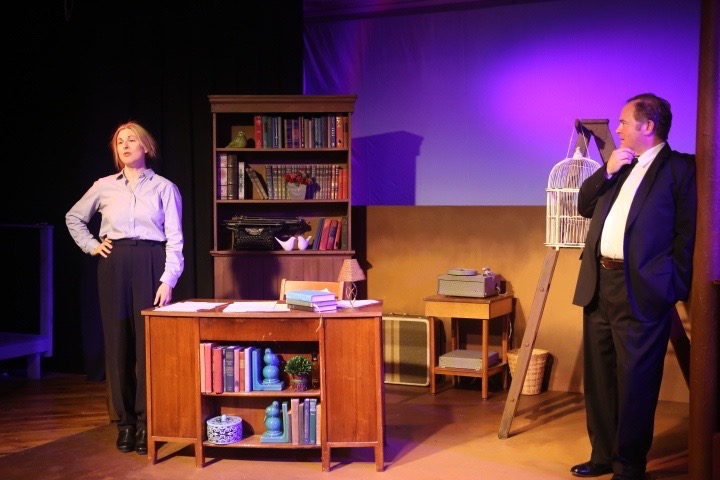Review: Theatre Nova's Dear Elizabeth

While watching Theatre Nova’s lovely new production of Sarah Ruhl’s play, Dear Elizabeth, drawn from 30 years of correspondence between poets Elizabeth Bishop and Robert Lowell, the phrase “alone together” comes to mind often.
Why? Because although they both experience love off-stage – Bishop with a woman in Brazil named Lota, Lowell with three different wives – their true first love is words; and like a jealous, possessive lover, words, when you’re a professional writer, demand that you spend most of your waking life alone with them, and only them.
So it’s not surprising that Lowell and Bishop – who lived a similarly isolated artistic existence, and consequently understood each other deeply – flung letters to each other as if they were life preservers.
In life, Lowell and Bishop wrote more than 800 letters to each other, offering praise and feedback for each other’s work; celebrating each others’ awards and personal victories; and chronicling their travels, as well as their battles with inner demons (Bishop’s depression and alcoholism, Lowell’s bipolar disorder). Not surprisingly, even the prose of their casual letters rings gorgeously poetic; in reference to a lighted swimming pool, Bishop wrote, “it is wonderful to swim around in a sort of green fire. One’s friends look like luminous frogs.”
The inherent challenge of an epistolary play, of course, involves giving the audience something to watch, not simply listen to. Ruhl lays the foundation for a visually satisfying production by way of stage directions, calling for occasional projections, and giving the actors a template for connecting scenes through actions; they also “live” certain quirky moments as they speak the words of their letters instead of pretending to write them.
But director David Wolber gets much credit, too, for adding his own creative touches, effectively using props, different areas of the set, and a movement pattern for the actors – partly inspired by Lowell’s frustrated observation that the two poets seem connected by a wire, so that when one moves, the other does as well – that keeps the audience engaged.
Another tricky prospect, however, involves how to present the poets in their moments of weakness, such as when Bishop pulls two filled wine glasses from her desk to drink. It’s initially funny, but when she then pulls out a bottle of rubbing alcohol and downs that, too, we know we’ve suddenly gone down the rabbit hole of addiction. Wolber and actress Carrie Jay Sayer handle the shift with sensitivity, not playing it too heavily or too lightly, but rather suggesting a haunting, all-too-natural progression into darkness. (Wolber specializes in plays about artists and the process of creation, so play and director are ideally matched here.)
Joel Mitchell is marvelous and heartbreaking as Lowell, a man who struggles mightily in his own life, and uses that as material for his confessional poetry. Sayer, meanwhile, is well-cast as Bishop, conveying the emotionally guarded poet’s simultaneous desire to connect to Lowell while also always maintaining an arm’s length distance; and the actress nails a running gag wherein, after showering Lowell with praise over a poem or collection, she pauses and says something like, “There are just three words I take objection to,” or “I have two minor questions.”
Similarly, Lowell critiques his letter-writing in a postscript – “The last part is too heatedly written, with too many ‘ands’ and so forth” – thus providing a glimpse of the writer’s particular brand of neurosis. But this telling moment also suggests why he and Bishop never find happiness for long: they each can’t stop trying to edit their own lives.
Carla Milarch designed the show’s sound (including key exterior noises), as well as its costumes (Mitchell pulls different jackets and sweaters from a coat stand on stage). And Daniel C. Walker designed the show’s lighting and set, with adjacent workspaces for each poet, a ladder upstage center, and a large, short rock downstage right.
Indeed, in Dear Elizabeth, the rock marks the spot where Lowell and Bishop spent time together on a beach one day in Maine, early in their friendship. In a rush of feeling, Lowell nearly proposed to Bishop there, and he later confessed this to Bishop, writing, “asking you is the might have been for me, the one towering change, the other life that might have been had.”
Though this is a beautiful, emotionally powerful admission to make, Dear Elizabeth makes you realize that in Bishop and Lowell’s case, Lowell’s failure to propose likely resulted in the pair having the most satisfying and durable kind of marriage they could ever hope to share with each other.
Jenn McKee is a former staff arts reporter for The Ann Arbor News, where she primarily covered theater and film events, and also wrote general features and occasional articles on books and music.
Dear Elizabeth runs through Sunday, September 25, at the Yellow Barn, 410 West Huron, Ann Arbor, MI, 48103. Call 734-635-8450 or visit Theatre Nova for tickets.


































